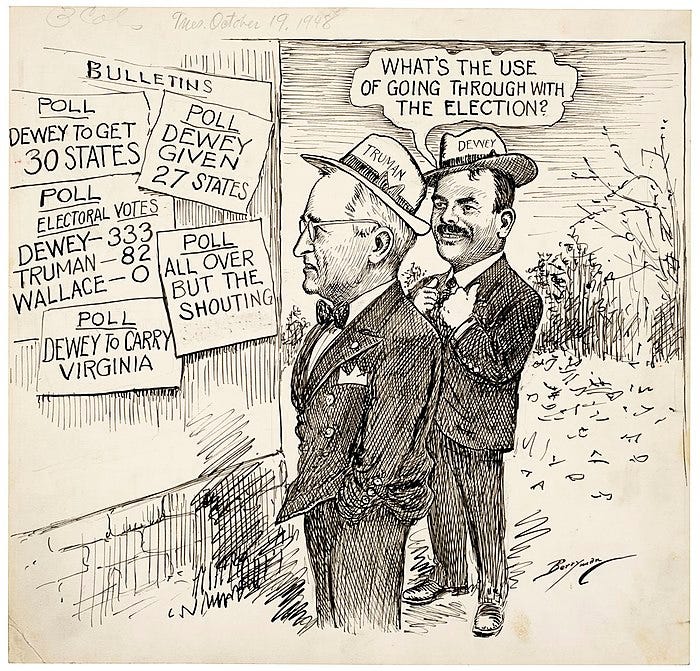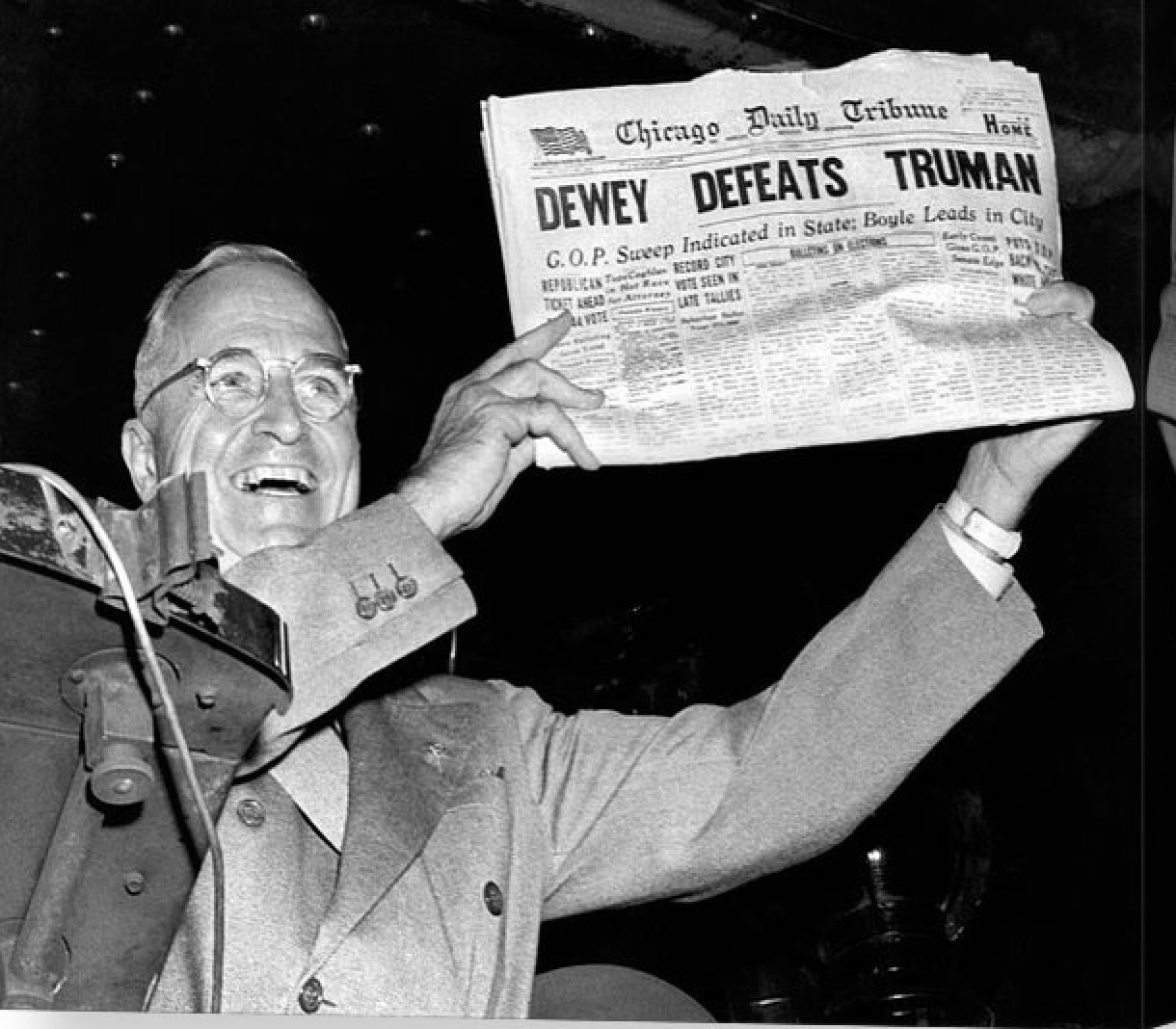Dear Friends,
I’m sharing a slightly more historical post. At the partner site
, — who writes the really great — reflects on Dickens.Best,
Sam
TRUMAN:DEWEY::BIDEN:TRUMP?
Everybody who’s ever been cut from a basketball team has to hear about how Michael Jordan, as a high school sophomore, didn’t make his varsity squad. Every American politician who’s badly trailing in the polls probably has to hear a pep talk at some point or other about how Harry Truman overcame an insurmountable deficit to defeat Thomas Dewey in 1948 (and I imagine it’s no more consoling than is the Michael Jordan speech).
There are enough substantial differences between the situation in 1948 and the situation now that I wouldn’t draw any explicit parallels between them, but I was surprised, in reading an account of the ’48 campaign from David McCullough’s Truman biography, to realize that there’s a certain amount to be learned from it.
For one thing, Truman and Biden (or, let’s face it, Biden about ten years ago) are somewhat similar figures.
-They took the inside track to the presidency and never exactly earned the acclaim of the American people.
-They had a no-nonsense centrist style of governance.
-Their best quality was a capacity to fight and to continue punching even when the odds were against them. As The Washington Post wrote in the aftermath of Truman’s stunning victory, “There was something in the American character that responds to the fighter” — and it may well have been the fact of Truman’s hardscrabble campaign while his opponent acted as if he could coast to victory that, more than anything, endeared Truman to the public.
-They were career politicians exactly in the schmaltzy sweet spot of projecting integrity while also knowing how the world really worked.
-They were not particularly effective or charismatic communicators but led from the heart and were apparently much better in interpersonal exchange than in scripted public address. Truman’s aides lamented that the public couldn’t see him as they saw him. Biden’s intimates are swearing up and down that he is sharp and fully in charge of his White House.
Truman started his campaign facing an “unbeatable” 13-point deficit, according to Elmo Roper’s poll. The Republicans had an efficient campaign and money machine. Truman’s campaign had no money for radio ads and barely enough even to support his whistlestop tour around the country — “we were one jump ahead of the sheriff,” his press secretary recalled. While the Dewey campaign provided reporters on the train with concierge services, for Truman campaign reporters it was “laundering clothes in a Pullman basin.”
Truman was seen to be middling and muddling, a non-entity who had somehow succeeded FDR. He had a habit of gaffing in press conferences (another trait shared with Biden) and was odd and corny in how he delivered his public addresses, in contrast to the orotund Dewey. After his initial sample, Roper simply suspended his polling for the campaign, not bothering to waste the money. Gallup found Dewey winning in all nine of the polls he conducted. Betting agencies assigned odds of, on average, 15:1 against Truman. In a Newsweek poll of fifty campaign reporters — people traveling with the campaigns and better positioned than anyone else to predict the result — fifty out of fifty thought Dewey would win.
But the conventional wisdom and the unanimity of predictions seemed not to bother Harry Truman, who put in a stupendously hard-working campaign. He traveled 20,000 miles, delivered 350 speeches, spoke in person to over three million people, and did all that while successfully managing the Berlin Airlift. In retrospect, when everybody had to reverse their headlines and analyses, these seemed to be the ingredients for Truman’s success:
-Sheer hard work and persistence.
-An ability to speak in simple, direct language to the American people. “He used no jargon, no stock jokes, nothing cute,” writes McCullough. “But the intent of his thought was always clear.”
-Attack mode. Dewey, assuming that he was as good as elected if he didn’t make any major mistakes, spoke in such bland generalities that it became a running national joke. Where Dewey’s speeches might include a line like, “Our streams are full of fish” or “America’s future is still ahead of us,” Truman constantly decried the “cold and cunning…Republican gluttons of privilege” and the “do-nothing” Republican Congress.
-The underlying prosperity of the country. The media and political class tended to get a little frothy about various crises that had occurred under Truman’s watch. For the majority of the public, though, it was a good period, and there was fundamentally no point in repudiating the incumbent. “What’s the matter with that fellow anyway? Can’t he stand four more years of prosperity?” one farmer said teasingly about a Dewey-leaning farmer.
-A widespread liking for Truman as a person. “There is an agreeable warmheartedness and simplicity about Truman that is genuine,” wrote The New Republic.
-A nostalgia for FDR and the New Deal. This was Truman’s own interpretation as to what had happened. “Really it was not [an upset],” Truman wrote of his victory. “It was merely a continuation of the policies which have been in effect for the last sixteen years and the policies that the people wanted.”
As one can see from this list, there’s a lot that’s inapplicable to Biden in 2024. The most worrying issue is that the Democratic Party has utterly lost the pulse of the heartland public. It’s very hard to imagine Joe Biden boasting that he never “skipped places” when sowing wheat or correctly guessing the age of a horse from looking at its teeth, as Truman did. The real political currency of the moment is the ability to communicate over social media, and Trump knows how to do that while the Democratic establishment just doesn’t. Meanwhile, it’s very difficult for modern Democrats to position themselves on the side of insurgents and upstarts — a necessary political skill. For so much of the country, the Democratic Party has become hopelessly tied to taxes, regulation, and coastal elitism. Even when they’re out of power they seem like the ‘establishment.’ Trump has understood the power of this attack line. The Democrats haven’t.
And there is no legacy of FDR or the New Deal to fall back on. It’s a bit unclear how the Democrats lost their identification as the party of working people but it did happen. A recent paper by the National Bureau of Economic Research traces the critical moment to 1976 and a shift in policy towards emphasizing taxes and redistributionist compensation as opposed to protecting workers. Other analyses could hold that the Democrats were linked with the unions and unions became an increasingly narrow and almost elite portion of the working world. That the anti-war movement, the riots at the 1968 convention and the nomination of McGovern in 1972, decisively alienated a great portion of working-class voters, who never really forgave the Democrats. That figures like Nixon, Reagan, and Trump harnessed populist language to good effect in ways that leading Democrats never quite managed. That demographics, as well as the logic of campaign contributions, drove the Democratic Party inexorably towards the coasts while giving up more and more of the heartland.
As much as I would love to believe that Biden can run the sort of underdog campaign that Truman did, he is not (at least at his age) the same sort of politician. In this election he really is just the box that people will check if they are alienated enough by Trump. But even as much as we are trying to stagger through to November, there are some lessons in here for the future of the Democratic Party. They really do need to connect back to the center of the country. They do need to find an effective outsider narrative (John Fetterman’s sweatshirts in the Senate aren’t a bad start). They do need to relearn the art of political communication.
And from something like Truman’s 1948 campaign, there are political verities to be gleaned. One is that polls really are not to be trusted. “I couldn’t have been more wrong. Why I don’t know,” Elmo Roper confessed after the election. The smart analysis is that many people changed their minds in the last weeks of the campaign — as the price of corn came down in the Midwest and as the Truman campaign took on a momentum of its own. The smarter analysis may be that polling and voting are two very different activities: that people respond to polls with their heads and vote with their guts. David Brooks claims that contemporary voters use polls to “vent not to vote” and the modern history of polling is full of duplicity by the population-at-large, with voters siding with Bush in 2004 out of fears about terrorism and siding with Trump in 2016 despite having told pollsters the opposite. Something similar seems to have happened in 1948, with voters feeling a sudden nostalgia for the New Deal at the time they cast their ballots.
The other lesson is that political communication is everything. I remember having a very bad feeling after the first debate in 2016. The pundits were unanimously declaring it a victory for Hillary, but Hillary was speaking in what came across like jargon-y political soup while Trump, if insane, sounded like an actual human being. This is, unfortunately, a lesson that Democratic politicians are very slow to learn. Biden always sounds just as manufactured as Hillary did. The sooner that generation gets out of the way, the better. They were raised on sound bites, paid ads, and press releases. Political communication is very different now: it’s social media and it’s naturalness in front of a camera. Anyone who has that can win. Anyone who doesn’t is just going to keep getting beaten by Trumpism.







As a Brit I see the Democrats as the party of the wealthy warmongers who want to destroy your children.
I see the republicans as the party of some wealthy warmongers. They are trying to get rid of those people that are like that. They also DON’T want to destroy your children.
Because high office here is a bloodsport of first, doing harm, stepping in the hands heads and hearts of your rivals. This essay makes reams of sense. We know from that effect of males first fighting, and then becoming chummy, that it happens. Let's grant both that 1 out of 12 folks may be sociopaths, and grant that that pathy' seems necessary....where does the person come from who talks themselves into visioning a unity among us out of tune tribes, and envisioning themselves making progress, businesslike progress toward some agenda? They could be what passes for a bsnssman in a wealthy country guided by finance industries. And then have everything to prove about passing for also a humane and jolly old soul. But in all events since Lincoln, they will be ready like Johnson like both Clintons like Sanders Kucinich like Nixon and like you say here and like Carter they have to have everything to prove in such a slow trash fire that the Office is a salve. Carter and Bill Clinton believed their highest self was a not-southern one but a member of this come from inside brutalizations into a democratic harmony polity. Some Californians feel that way, perhaps a person born into trouble there will seek to live an whole life of fighting for the Californication of all. The Carter malaise speech was asking for more trouble, more opponents to win over, I admired the bully pulpit there. Teddy Roosevelt good Lawd , the bull moose party, just spoiling for anarchists to join their meetings so that those planning sessions could wind up in friendly boxing matches.